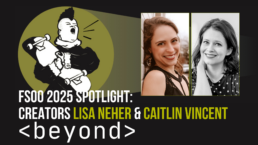Meet the composer and librettist of Beyond, one of the three winning micro-operas for FSOO 2025!
Often the most poignant and powerful dialogue happens between those who create and those who perform. That’s why OOO connects our singing-artists with the composers and librettists selected for the 7th Annual Fresh Squeezed Ounce of Opera.
If you’re curious about the story inspiration, what to listen for, what to expect, and more, you’re in the right place.
Here, get the scoop behind the story of Beyond, written by Lisa Neher (composer) & Caitlin Vincent (librettist) – with questions from the cast – designed to enhance your experience. Bonus: you will be among the very first to hear this work, making its World Premiere!
First, a quick synopsis:
Consider what waits for you beyond that door. A glimpse of one possible future for humanity in the stars, this short work is a compelling meditation on life, death, the cycle of oppression, and what it means to be truly human.
What was the initial germ of an idea that evolved into this opera?
Lisa: I’m a big science fiction fan and it’s a genre I would love to see more in opera and classical music. Sci-Fi is a fabulous genre for asking questions, or telling new stories that aren’t stuck in old gender and identity tropes, and for expanding the opera canon of characters for all voices, especially for sopranos and mezzos, who are underused in standard repertoire. There are so many developments happening right now with “artificial intelligence” / large language models and technology used in our daily lives that it felt relevant to extrapolate that into a future society that relies on androids as its working class laborers. We were both interested in how a story about androids and their sentience and self-determination could reflect many topics we care about, from workers rights to the rights of undocumented people to our relationship to technology.
Caitlin: Lisa and I are both big science fiction fans and we were really intrigued by the possibilities for bridging sci-fi and opera. This particular idea evolved in response to a 2022 call for proposals for a “micro-opera” for two female voices. Lisa suggested that we explore something futuristic involving space travel, and I used the germ of that idea to develop a storyline about two androids waiting to be decommissioned.
Did the libretto come first or did they evolve at the same time?
Caitlin: In all of my collaborations, I always write the libretto first. This gives me an opportunity to map out the structure and pacing of the opera’s story and also incorporate the nuances of each character into the text. After I finalized a draft of the libretto for Beyond, I handed it off to Lisa so she could start developing the musical language. Throughout the process of composition, we remained in close contact and worked through a number of additional changes and rewrites in the process of her setting the text to music.
Lisa: Caitlin wrote the libretto first before I composed the music. For a short opera, I find it particularly important that the libretto is written and workshopped first, because it will inspire and dictate the form and pacing of the piece. Seeing the entire story helps me to structure the length of arias and duets, pacing of exposition versus action musically, and to create motives that express the characters and can evolve with them as they change during the story.
What caused humans to leave earth?
Lisa: One of the things I appreciate about Caitlin’s libretto is that it leaves us with so many more questions than answers! My sense as we were working on the piece was that the Earth has become unlivable due to climate change and pollution, or overpopulated to the point where a group of humans needed to find a different location to thrive.
Caitlin: As I was writing this text, I imagined humans being forced to leave earth because of a climate change disaster. However, as Lisa suggests, it really could be any kind of apocalyptic event! The key is that humans were forced to go…it wasn’t an intentional choice. And in their desperation to ensure the survival of the human race, they made decisions that gradually stripped away their humanity, including building what essentially amounts to a slave population.
Why did they keep building androids after figuring out they were sentient and would need to be destroyed?
Caitlin: Because of the length of the journey and the technological complexities of maintaining a space fleet, the humans need the androids to survive. However, as soon as they realized the androids had grown sentient, they did begin to “clean house”: culling the majority of the older generations and replacing them with younger models that hadn’t yet reached sentience. This is one of the reasons for 142-6’s bitterness: they’re one of the few surviving androids from those early generations. What has changed—and what we’re capturing in Beyond—is that humans are now finally approaching their destination and have decided to dismantle the entire android population before landing on the site of their new colony.
Lisa: Space travel to any potentially habitable world would take many years, so my sense is that the trip is quite long and humans on the voyage needed workers that weren’t human. Perhaps humans are in deep hibernation or something of that sort, due to the far distance of the new colony. So there is a need for labor until they get to the colony–but as we discover, the timeline has been moved up, so the humans must be close to where they are going to settle and want to “clean up” any loose threads.
We know how 142-6 and 503-2 find each other. How did you find each other (Lisa and Caitlin)?
Lisa: I’ve been aware of Caitlin’s work for a while now. We were introduced by composer Tom Cipullo, who was my mentor in the National Association of Teachers of Singing Composer Mentorship program a few years ago. Since then, we’ve written a song cycle about climate change, “Honeyed Voices,” commissioned by Cristina Gallo for her Siren Songs project, and a choral work, “I dug up a rose”, commissioned by Porter-Gaud School in honor of 50 years of the school being a co-educational institution. It’s so wonderful to work with Caitlin because she has a specific theatrical vision for her words and she writes in such a character-driven way. I come from a background in theatre, and that gives us a common frame of reference for storytelling through opera and beyond.
Caitlin: Lisa and I have a number of mutual connections, and I’ve been a long-time admirer of her work. We had our first official “meet and greet “ via Zoom back in 2022 and have since collaborated on three pieces together!
Go beyond about Beyond! Get the scoop (and possible spoilers?) in this short vid below!


